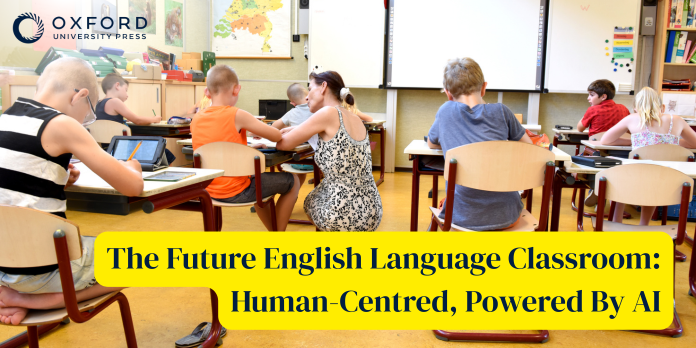In a not-so-distant future, the English language classroom has been transformed, not by replacing teachers with machines, but by empowering teachers through technology. An AI assistant listens as students speak in pairs, offering real-time feedback on fluency and pronunciation. The teacher, freed from constant correction, moves between groups offering personalised support, encouraging self-expression, and facilitating meaningful dialogue. Behind the scenes, AI suggests reading materials tailored to individual interests and proficiency levels. Data dashboards provide insights to guide planning. At the centre of it all is the teacher who is busy connecting with and inspiring their students.
This vision is no longer science fiction. AI-powered tools are already entering the classroom, offering new possibilities for assessment, feedback, and differentiation. But as these technologies evolve, so too must our understanding of what it means to teach and to learn. English language teachers are not only essential in this transition, but they must also lead it.
Teachers as Human Guides in a Digital Age
As AI becomes more capable, some tasks traditionally carried out by teachers, such as marking writing, assessing pronunciation or diagnosing common errors, can now be supported or automated by AI. Yet this does not diminish the teacher’s role; this shift makes their human contribution all the more valuable.
Language learning is profoundly human. It is about communication, cultural nuance, emotional expression, and social interaction. These are areas where good teachers excel and where AI cannot replicate the depth of human connection, empathy, or contextual judgement.
The future classroom is not about replacing teachers. It’s about redefining their role from deliverers of content to curators of experience. With AI handling repetitive or administrative tasks, teachers can spend more time supporting learners’ confidence and nurturing critical thinking.
Collaboration: The Key to Getting AI Right
For AI to genuinely enhance language education, we need more than good technology; we also need deep collaboration. Too often, new tools are introduced without sufficient input from the very people expected to use them. English teachers must be involved as co-creators, not just consumers. Their expertise is critical in ensuring AI tools are pedagogically grounded, culturally sensitive, and practically usable.
That’s why collaboration across sectors is essential. Technologists need to understand the realities of the classroom. Academics must provide research that is both rigorous and accessible. Governments and policy-makers must ensure systems are ethical, inclusive, and supported by professional development. When all these groups work together, we can design AI-enhanced tools that are not only powerful but also trustworthy and equitable. This ethos is espoused by the AI in Education at Oxford University (AIEOU) interdisciplinary research hub, which serves to facilitate such dialogues; all are welcome to join.
Shaping the Future, Together
The future of English language education will not be shaped by technology alone. It will be shaped by the choices we make regarding how we use these tools, what values we prioritise, and who we include in the conversation.
Teachers must claim their place at the heart of this journey. As AI evolves, our mission remains to support teachers in unlocking every learner’s potential. That means investing in research, sharing evidence, and developing tools that are designed with teachers, not just for them.
Imagine a classroom where every learner receives personalised support, where teachers feel empowered, not overwhelmed by technology, and where assessment is integrated, dynamic, and fair. This is not just a vision of what could be. With the right collaboration, it’s a future we can create. If we work together.
Watch the full session here:
Dr Sara Ratner, a researcher in the Department of Education at the University of Oxford, brought her expertise in language assessment to the Oxford University Press Signature Event at IATEFL 2025. Alongside fellow panellists Kelly Webb-Davies and Donald Clark, she explored the provocative question: Teaching and Assessing Writing – Does AI Change Everything? Each speaker offered a unique perspective on the evolving role of artificial intelligence in the classroom.



This article resonates deeply with my perspective on the evolving role of technology in education, particularly in English language teaching. The vision of AI as an empowering tool—rather than a replacement for teachers—aligns with my belief that the heart of education lies in human connection, empathy, and adaptability.
As an educator, I’ve seen how technology can enhance learning when used thoughtfully, but I’ve also witnessed the irreplaceable value of a teacher’s guidance in fostering confidence, critical thinking, and cultural understanding. The idea of AI handling repetitive tasks like pronunciation feedback or grading excites me because it would free up more time for meaningful interactions—whether through personalised mentorship, creative discussions, or nurturing a love for language.
However, the article’s emphasis on collaboration stands out as the most crucial takeaway. Too often, edtech tools are designed without teacher input, leading to impractical or pedagogically weak solutions. I strongly agree that teachers must be co-creators in this transition, ensuring AI tools are inclusive, ethical, and grounded in real classroom needs. The interdisciplinary approach advocated by initiatives like AIEOU is inspiring—progress must bridge gaps between technologists, policymakers, and educators.
Moving forward, I’m committed to engaging in these conversations, advocating for teacher-led innovation, and exploring how AI can augment—not automate—the art of teaching. The future described here isn’t just possible; it’s necessary, and I want to be part of shaping it.
that is wonderful!
In this immediate future that Teachers working with tools like AI be co-worker is a great journey to do every time.